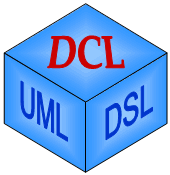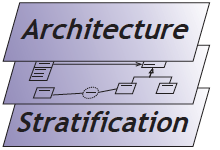
 |
Object-Oriented MetamodelingObject-Oriented Metamodling is a technological base
resting on the columns of Object-Orientation, Modeling, and Meta-Levels.
We are exploring the conceptual foundations and principles required
for an optimal combination, enabling systematic and sound object-oriented
modeling in multi-level modeling architectures. Areas of concern include
meta-formats and meta-based tools as well as UML metamodeling problems,
and solutions. Well-published results of this work are the "Orthogonal
Classification Architecture" and the "Unified Modeling Library".
Suggested reading: "Concepts
for Comparing Modeling Tool Architectures", "Reducing
Accidental Complexity in Domain Models", and "Model-Driven
Development: A Metamodeling Foundation". |
|
 |
Domain Customized LanguagesModeling is gaining increasing importance and the
question of which modeling language is the best is brought into focus
more than ever. Two diverging views argue that standardization is required
as an enabler of communication on the one hand, and that domain-specificity
is necessary to avoid impendence mismatch on the other hand. The concept
of a "Domain-Customized Language" is designed to provide the
optimal compromise, thus reconciling the two abovementioned camps as
much as possible. Suggested reading: "A Tour of Language Customization
Concepts", Advances
in Computers 70. |
|
 |
Architecture StratificationThis research strand is concerned with the issues
involved in defining useful architectural system descriptions for complex
software systems. The underling principle is the idea of identifying
distinct architectural viewpoints, known as strata, each capturing different
concerns of the system respectively. Suggested reading: A
brief tour to Architecture Stratification, "Aspect-Oriented
Development with Stratified Frameworks" and "Generating
Systems from Multiple Levels of Abstraction". |
|
 |
OpenExpertise(in cooperation with wibas
GmbH) OpenExpertise is a system of expertise patterns which provide proven solutions for project situations. Expertise patterns help the members of project teams to systematically plan and run a project to deliver the results on time and on budget. |
|